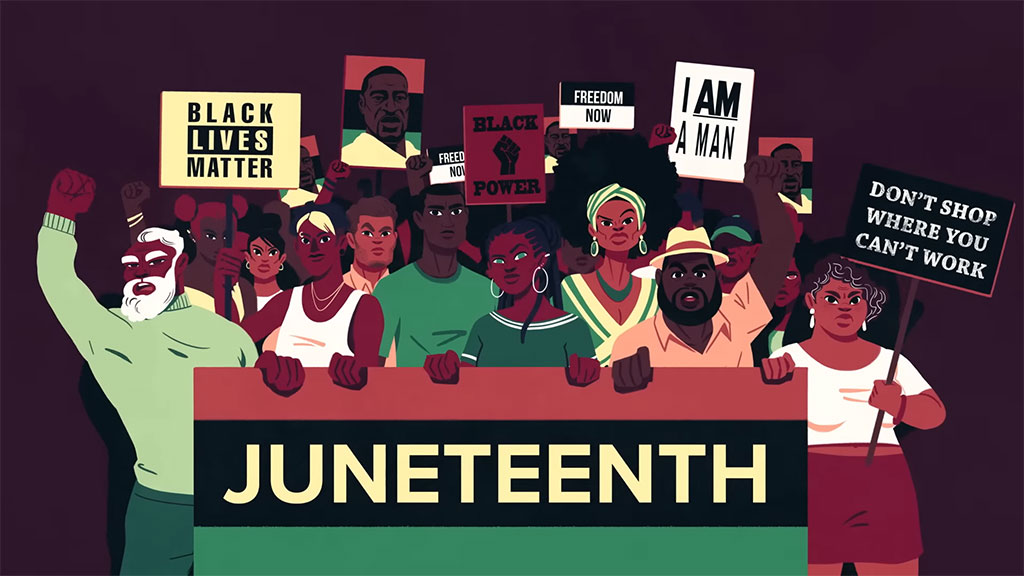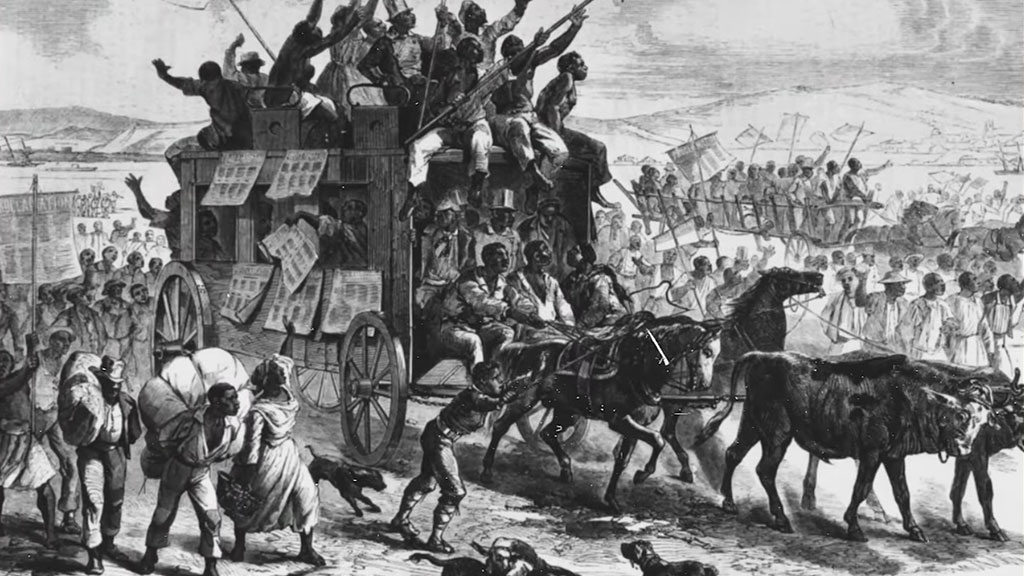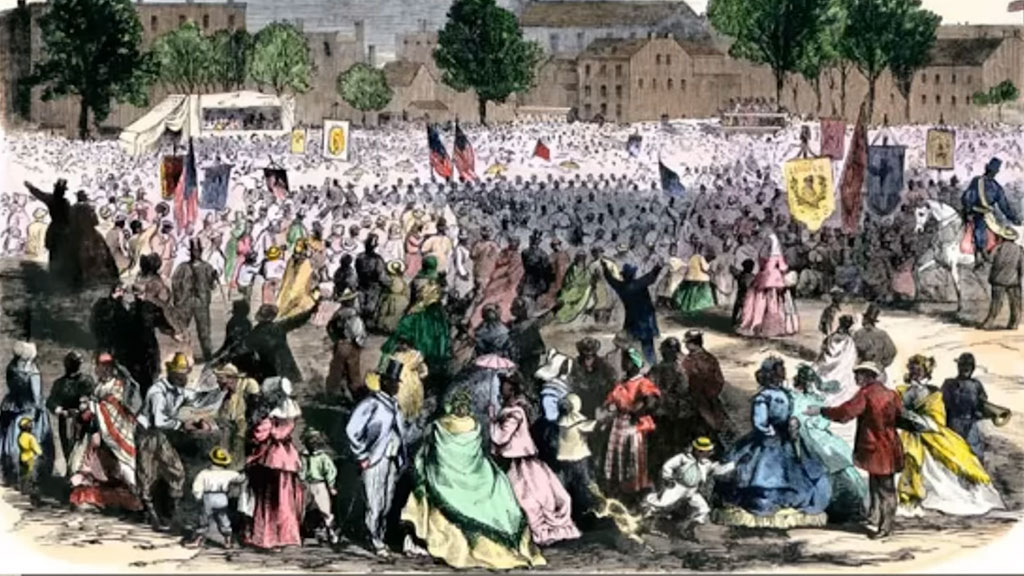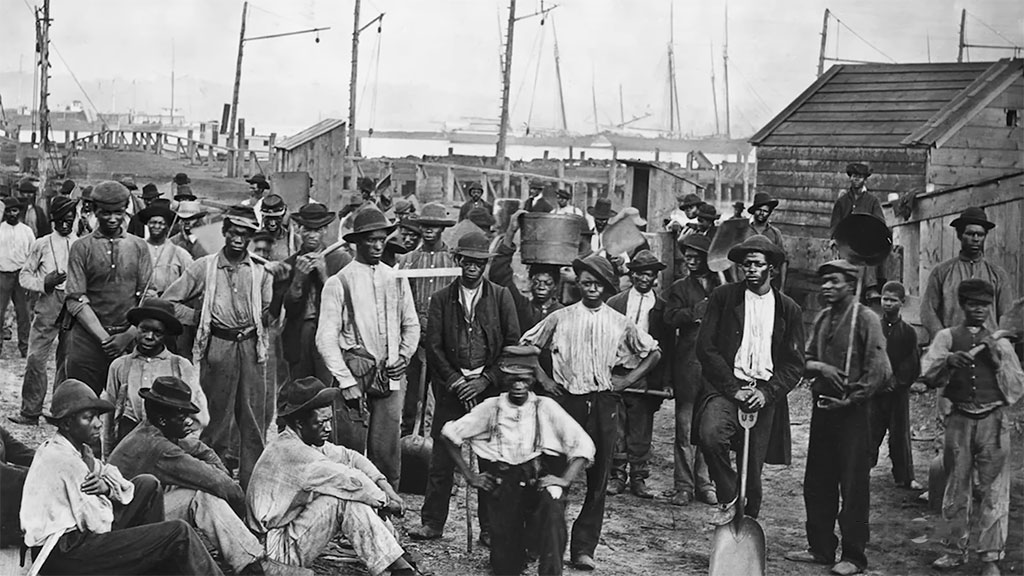Juneteenth, also known as Freedom Day or Emancipation Day, commemorates the end of slavery in the United States.
It marks the day when news of the Emancipation Proclamation reached Galveston, Texas, on June 19, 1865, two and a half years after it was issued.
This significant moment in American history celebrates the liberation of African Americans and the enduring struggle for equality.
The history of Juneteenth is a testament to the resilience and perseverance of the African American community in the face of oppression.
It serves as a reminder of the long journey towards freedom and justice, highlighting the importance of remembering the past to shape a more inclusive future.
Understanding the origins and significance of Juneteenth is crucial in honoring the struggles and achievements of those who fought for freedom and equality.
The Origins of Juneteenth

Juneteenth traces its origins back to the Emancipation Proclamation’s profound impact on the enslaved African American population in the United States.
The Emancipation Proclamation’s Impact
Issued by President Abraham Lincoln on January 1, 1863, the Emancipation Proclamation declared all enslaved individuals in Confederate territory to be forever free.
Despite being a pivotal moment in American history, the news of this proclamation took time to reach the remote areas of the South due to the challenges of communication during the Civil War.
Juneteenth, also known as Freedom Day, commemorates the delayed announcement of emancipation in Galveston, Texas on June 19, 1865 – two and a half years after the Emancipation Proclamation. This day symbolizes freedom and the end of slavery in the United States.
The Events of June 19, 1865
It was on June 19, 1865, in Galveston, Texas, that General Gordon Granger arrived with Union troops to announce the federal order proclaiming freedom for all enslaved people in Texas.
This event marked the official end of slavery in the state and the belated realization of freedom for many African Americans who had been unaware of their legal emancipation for over two years.
Juneteenth is now widely celebrated as the oldest nationally celebrated commemoration of the ending of slavery in the United States.
It stands as a day of reflection, education, and celebration of African American freedom and achievement.
Juneteenth in Texas: The Early Celebrations

Juneteenth in Texas began with initial observances that showcased the jubilant spirit of newly liberated African Americans.
In the years following General Granger’s announcement in Galveston on June 19, 1865, freed slaves and their descendants organized gatherings to commemorate their emancipation.
These early celebrations symbolized hope, freedom, and the resilience of a community overcoming the shackles of slavery.
Initial Observances in Texas
The initial observances of Juneteenth in Texas were characterized by community gatherings that featured a mix of religious services, feasting, dancing, and cultural activities.
Families and communities came together in a spirit of unity and reflection, recounting their shared history of struggle and triumph.
These celebrations served as a powerful reminder of resilience and the collective journey towards freedom.
Over time, Juneteenth celebrations spread beyond Texas, gaining recognition across the United States as a day to honor African American freedom and achievement.
Today, Juneteenth is widely observed with a variety of events such as parades, concerts, and festivals that showcase the rich cultural heritage and significance of this historic day.
Spread Across the Southern States
As the legacy of Juneteenth in Texas grew, the celebrations spread across the Southern states, gaining popularity and significance.
African American communities in neighboring states embraced the tradition, organizing similar events to honor their ancestors’ struggles and celebrate their freedom.
The observance of Juneteenth became a unifying force, fostering a sense of belonging and cultural pride among African Americans in the South.
This annual commemoration served as a reminder of the resilience and perseverance of African Americans in the face of oppression and injustice.
It continues to be a symbol of liberation and a time for reflection on the progress made towards racial equality in the United States.
Evolution of Juneteenth Celebrations

Juneteenth celebrations have evolved over time, blending traditional practices and symbols with modern-day observances that honor the history and significance of this important day in American history.
Traditional Practices and Symbols
In its early days, Juneteenth celebrations in Texas included a range of traditional practices and symbols that reflected the resilience and hope of newly freed African Americans.
These practices often involved religious services to give thanks for freedom, communal feasting to symbolize unity and abundance, and cultural activities like music and dance that showcased the rich heritage of the African American community.
Symbols such as the Juneteenth flag, with its vivid colors representing resilience, and the red foods like strawberry soda and red velvet cake, symbolizing the blood shed by ancestors, added depth and meaning to the celebrations.
Modern-Day Observances
In the present day, Juneteenth observances have expanded beyond Texas to become a nationwide celebration of freedom and equality.
Modern commemorations include community gatherings, parades, music festivals, historical reenactments, and educational events that focus on African American history and culture.
These observances not only honor the past struggles and achievements of African Americans but also serve as platforms for advocating social justice and equality for all.
The use of social media and digital platforms has further amplified the reach and impact of modern-day Juneteenth observances, spreading awareness and fostering a sense of unity and solidarity among diverse communities across the country.
The Road to Federal Recognition

In the journey towards federal recognition of Juneteenth, several significant milestones have marked the progress of acknowledging and honoring this pivotal day in American history.
State-Level Recognitions Over the Years
Here are the stages of state-Level Recognitions over the years of Juneteenth:
Texas
Being the birthplace of Juneteenth, Texas was the first state to recognize Juneteenth as a state holiday in 1980, leading the way for other states to follow suit.
Other States
Over the years, a domino effect ensued as more states started officially recognizing Juneteenth as a holiday, with states like New York, Virginia, and Pennsylvania among those commemorating the day with various events and activities.
Growing Recognition
The increasing number of states recognizing Juneteenth highlights the widespread acceptance of the importance of this historical event and its role in celebrating freedom and equality.
Legislative Efforts
Congressional efforts to establish Juneteenth as a national holiday gained momentum with the introduction of the Juneteenth National Independence Day Act.
Bipartisan Support
The bipartisan support for the bill reflected a unified acknowledgement of Juneteenth’s significance in American history and its importance in commemorating the end of slavery in the United States.
Historic Signing
On June 17, 2021, President Joe Biden signed the bill into law, officially designating Juneteenth as a federal holiday, making it the first new federal holiday since Martin Luther King Jr. Day was established in 1983.
Juneteenth Today and Its Cultural Impact
Juneteenth today holds significant cultural impact, celebrated nationwide with events honoring African American heritage, resilience, and the ongoing pursuit of freedom and equality.
Juneteenth’s Impact on Education and Public Awareness
Educators across the United States integrate Juneteenth into their curricula to provide students with a more comprehensive understanding of American history.
They highlight the significance of the holiday in acknowledging the struggles and resilience of African Americans in their pursuit of freedom.
Public awareness about Juneteenth has grown significantly in recent years, leading to increased discussions and observances nationwide.
Social media platforms, educational programs, and community events play a crucial role in raising awareness about Juneteenth and its historical importance.
Juneteenth in Popular Culture and Media
In modern popular culture, Juneteenth has gained prominence through various artistic expressions, including music, literature, and visual arts.
Artists often use their platforms to commemorate the spirit of Juneteenth and amplify the voices of marginalized communities.
The portrayal of Juneteenth in mainstream media has helped bring the holiday to a broader audience, fostering greater cultural understanding and appreciation.
Films, television shows, and documentaries that spotlight Juneteenth contribute to its recognition as a vital part of American history and culture.
Frequently Asked Questions
What is the significance of Juneteenth?
Juneteenth marks the end of slavery in the United States and celebrates freedom and equality.
How did Juneteenth become a federal holiday?
President Joe Biden signed the Juneteenth National Independence Day Act in 2021, establishing Juneteenth as a federal holiday.
What is the cultural importance of Juneteenth?
Juneteenth is a symbol of resilience, cultural heritage, and the ongoing pursuit of freedom for all.
How is Juneteenth celebrated?
Juneteenth is celebrated through community events, educational initiatives, historical reflections, and cultural performances.
What does Juneteenth signify for American history?
Juneteenth commemorates the end of slavery and highlights the struggles and achievements of African Americans in the United States.
Conclusion
Juneteenth stands as a profound testament to resilience, freedom, and the ongoing journey towards equality in America.
Originating from the delayed but momentous announcement of emancipation in Texas on June 19, 1865, Juneteenth has evolved into a nationally recognized celebration of African American heritage and liberation.
It serves as a critical reminder of the injustices of slavery and the enduring strength of the African American community.
The journey towards federal recognition as a holiday underscored its cultural and historical significance, culminating in its designation as a federal holiday in 2021.
Today, Juneteenth continues to grow in prominence, fostering education, reflection, and unity across communities nationwide.
Its impact on American culture and consciousness is profound, challenging us to confront our past while celebrating the resilience and achievements of African Americans in their pursuit of justice and equality.
Juneteenth remains a pivotal day of commemoration and celebration, honoring a legacy of perseverance and hope for generations to come.
Jaclyn Lowe